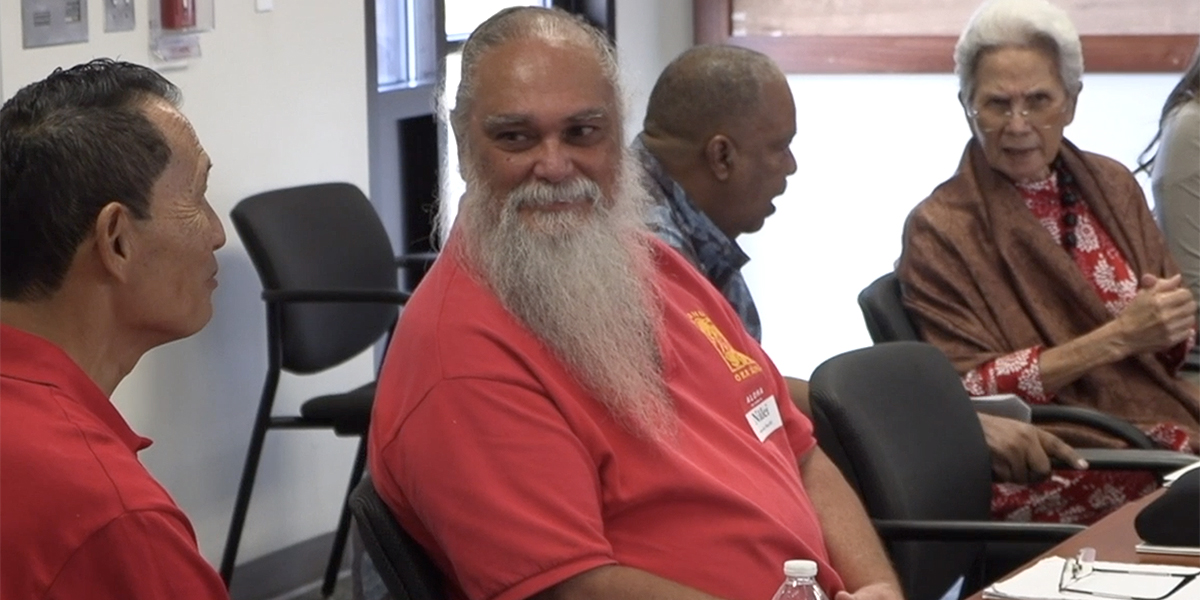A University of Hawaiʻi Cancer Center project, Kū Ola (“upstanding and principled healthy living”) works to support culturally-grounded services that promote the health, and well-being of Native Hawaiian men. One project goal is to expand, reaching more Native Hawaiian communities throughout the state, another is to encourage new Native Hawaiian researchers to ensure that methods used in health promotion are grounded in Hawaiian traditions and culture.
For more than a decade, the Kū Ola project has supported health promotion in Native Hawaiian men by holding kūkākūkā (discussion sessions) with kāne. The project has also captured the knowledge of kupuna kāne for posterity. Kū Ola is guided by the UH Cancer Center’s Native Hawaiian Community Advisory Board, a group of Native Hawaiian health professionals and community partners.
High rates of chronic illnesses and behaviors often result in a higher risk of death for Native Hawaiians, particularly for Native Hawaiian men. “We recognize that many of the chronic health challenges Native Hawaiians face, especially men, are the result of systemic inequalities that lead them to forego doctor visits and healthcare priorities,” said Claire K. Hughes, DrPH, chair of the UH Cancer Center’s Native Hawaiian Community Advisory Board. “Building upon the strengths of our community and incorporating Hawaiian practices and cultural values in health promotion can be effective in reducing chronic illness.”
Kū Ola’s leadership team is working to build collaboration with more Native Hawaiian communities. As a project launch, Kū Ola met with community organizations in Kona Hawaiʻi, in early February. The purpose of the meeting was to increase connections and identify strategies to address the health needs of Native Hawaiians in the West Hawaiʻi community. The project plans to eventually meet with other community organizations statewide.
“Kū Ola will foster Native Hawaiian students interested in health and clinical care,” said Kevin Cassel, DrPH, the project’s principal investigator. “We’re encouraging Native Hawaiian researchers to develop pilot health research projects.”
“Health disparity and access to health care are among the top priorities identified at the UH Cancer Center,” said Naoto Ueno, MD, UH Cancer Center director. “This wonderful initiative will have a tremendous impact in continuing to address the health challenges of Native Hawaiians.”
Questions? / More Information
If you would like to learn how you can support UH students and programs like this, please contact us at 808 376-7800 or send us a message.
# # #
The University of Hawai‘i Foundation, a nonprofit organization, raises private funds to support the University of Hawai‘i System. The mission of the University of Hawai‘i Foundation is to unite donors’ passions with the University of Hawai‘i’s aspirations by raising philanthropic support and managing private investments to benefit UH, the people of Hawai‘i and our future generations. uhfoundation.org
The University of Hawaiʻi Cancer Center, through its various activities, including scientific research and clinical trials, adds more than $57 million to the Oʻahu economy. It is one of only 71 research institutions designated by the National Cancer Institute. An organized research unit within the University of Hawaiʻi at Mānoa, the UH Cancer Center is dedicated to eliminating cancer through research, education, patient care, and community outreach with an emphasis on the unique ethnic, cultural, and environmental characteristics of Hawaiʻi and the Pacific. Learn more at uhcancercenter.org. Connect with us on Facebook/Instagram/Twitter @UHCancerCenter
